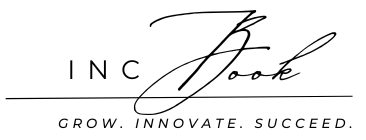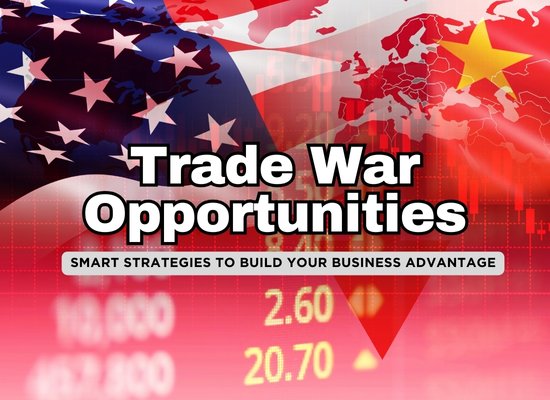Tariffs and trade wars often spell uncertainty and rising costs for many industries. However, for those who can spot opportunities amidst the challenges, these disruptions can become a goldmine. As global supply chains shift and prices fluctuate, businesses that adapt quickly can capitalize on new demands and market gaps. Whether it’s sourcing locally, pivoting product lines, or offering value-added services, trade wars can present unexpected paths to growth.
1️⃣ Local Manufacturing and Production Hubs 🏭
Overview:
With tariffs driving up the cost of imported goods, businesses and consumers are looking for locally-made alternatives. Establishing or expanding a local manufacturing hub can position your business to meet the rising demand for tariff-free products. Industries like textiles, machinery, and construction materials have seen increased opportunities to serve both businesses and consumers with domestic goods.
IncBook Tip: Offer “Made in the USA” branding for your products to attract customers seeking locally-made, tariff-free alternatives.
How to capitalize:
- Partner with local suppliers to secure raw materials at competitive prices.
- Emphasize speed-to-market, as local production often has shorter lead times than overseas competitors.
- Seek government incentives or grants that promote domestic manufacturing to reduce your startup or operational costs.
Why it works:
Consumers and companies are increasingly supporting local businesses to avoid the volatility and high costs associated with imported goods. Additionally, local products may bypass delays caused by customs or trade regulations, giving you a competitive edge.
2️⃣ Import Substitution Consulting 📊
Overview:
Companies dependent on imports may struggle to adjust when tariffs inflate prices. Offering consulting services that help businesses find domestic suppliers or alternative international partners provides a valuable opportunity to profit in this environment.
IncBook Tip: Create a network of vetted domestic suppliers and international partners to offer a full-service import-substitution package.
How to capitalize:
- Analyze a client’s supply chain to identify products or components affected by tariffs.
- Provide research on local or tariff-friendly alternatives that meet the same specifications.
- Offer guidance on compliance, logistics, and cost modeling to ensure a seamless transition.
Why it works:
Businesses are often caught off guard by sudden tariff hikes and need expert help to adapt quickly. Providing tailored solutions that reduce costs and maintain operational efficiency builds long-term client trust and creates repeat business opportunities.
3️⃣ Exporting to Tariff-Free Markets 🌐
Overview:
While tariffs may restrict imports and exports between certain countries, other regions with favorable trade agreements remain open. Businesses that identify and expand into these tariff-free markets can create new revenue streams with less competition from traditional players.
IncBook Tip: Research Free Trade Agreements (FTAs) and focus on exporting to regions where tariffs on your products are low or nonexistent.
How to capitalize:
- Evaluate which markets are exempt from current tariffs on your goods and services.
- Partner with distributors or agents in those regions to simplify market entry.
- Tailor your marketing and product offerings to meet the local preferences and regulations of your target markets.
Why it works:
While competitors may struggle with increased costs and reduced market access, businesses that pivot to tariff-free regions can maintain profitability and even grow their market share. FTAs and regional partnerships often provide stability in otherwise turbulent trade conditions.
4️⃣ Domestic Raw Material Sourcing Business 🪵
Overview:
As import duties on raw materials like steel, aluminum, and timber increase, companies are seeking domestic alternatives. Launching a business that sources and supplies raw materials locally can help meet this growing demand while avoiding the costs associated with tariffs.
IncBook Tip: Build partnerships with domestic mines, farms, or factories to ensure a steady supply chain and competitive pricing for raw materials.
How to capitalize:
- Identify industries affected by raw material tariffs and approach them with local supply options.
- Offer bundled services like logistics and storage to simplify operations for your clients.
- Negotiate long-term contracts to stabilize both your costs and client pricing, ensuring a reliable revenue stream.
Why it works:
Tariff-induced price hikes motivate companies to move away from imported materials, creating a steady demand for reliable local suppliers. By offering consistent pricing and availability, you can establish a long-term foothold in multiple industries.
5️⃣ Tariff Mitigation Legal and Compliance Services ⚖️
Overview:
Navigating complex tariff regulations and trade laws can be overwhelming for many businesses. Companies need guidance on minimizing tariff exposure through compliance strategies, trade agreements, and tariff classification optimization. Offering these legal and compliance services is a lucrative opportunity in a tariff-heavy market.
IncBook Tip: Provide tariff reclassification audits, where you help clients identify ways to reduce duties based on product codes and trade exemptions.
How to capitalize:
- Offer consulting packages that include tariff reduction strategies and compliance training.
- Collaborate with trade attorneys and customs brokers to handle complicated cases involving cross-border regulations.
- Create digital resources or tools (such as tariff tracking software) that clients can use to monitor ongoing trade developments.
Why it works:
Many businesses are willing to pay for expert advice that helps them reduce costs and avoid regulatory penalties. By staying up to date on ever-changing trade policies, you become an indispensable resource for companies dealing with international supply chains.
6️⃣ E-commerce Retail of Tariff-Free Alternatives 🛍️
Overview:
As tariffs drive up the cost of imported goods, e-commerce businesses that offer tariff-free or locally sourced alternatives can capitalize on price-sensitive consumers. Whether it’s electronics, clothing, or household goods, customers are actively looking for affordable options that aren’t impacted by trade wars.
IncBook Tip: Use targeted ads emphasizing “No Import Tariffs” and “Locally Sourced” to attract price-conscious buyers.
How to capitalize:
- Research which products are heavily impacted by tariffs and find or develop alternatives with lower costs.
- Optimize your website with clear filters and categories for tariff-free products to improve the shopping experience.
- Leverage partnerships with local suppliers to keep your inventory diversified and competitively priced.
Why it works:
With consumers facing higher prices due to tariffs, businesses that offer affordable alternatives can quickly gain traction in the e-commerce space. By highlighting cost savings and local sourcing, you can build brand loyalty and grow your online presence.
7️⃣ Cross-Border Warehousing and Distribution 📦
Overview:
Tariffs on direct imports can be reduced or avoided by using strategically located warehouses in tariff-friendly countries. Offering warehousing and distribution services near key trade routes allows businesses to bypass certain duties and keep their supply chains flexible.
IncBook Tip: Establish distribution centers near Free Trade Zones (FTZs) to attract importers looking to lower tariff-related costs.
How to capitalize:
- Identify locations near major ports in tariff-friendly regions to set up your warehouses.
- Offer inventory management, fulfillment, and last-mile delivery services to businesses dealing with cross-border logistics.
- Provide tariff guidance, helping clients move goods through countries with favorable trade agreements.
Why it works:
Businesses need cost-effective solutions to navigate rising tariffs. By positioning yourself as a distribution partner with access to favorable regions, you offer a competitive advantage to importers and exporters alike.
8️⃣ Freight Brokerage and Logistics Optimization 🚛
Overview:
In a tariff-heavy environment, businesses need help optimizing shipping routes to minimize duties and transportation costs. Starting a freight brokerage or logistics consulting service positions you as a vital partner for companies adapting to new trade realities.
IncBook Tip: Focus on developing tariff-friendly trade routes and consolidating shipments to reduce overall costs for your clients.
How to capitalize:
- Partner with customs brokers and freight carriers to streamline cross-border shipping services.
- Offer multi-modal logistics solutions (air, sea, and land) to give businesses flexible transport options.
- Use technology to analyze and optimize shipping costs, route efficiency, and tariff compliance.
Why it works:
Logistics inefficiencies can compound tariff expenses, making businesses eager to find solutions that improve margins. By offering tailored shipping strategies, you can help companies reduce both time and cost in their supply chains.
9️⃣ Custom Product Development for Tariff-Free Markets 🛠️
Overview:
Instead of importing products that face high tariffs, many businesses are pivoting to developing custom products that can be manufactured locally or with tariff-free components. Offering product development services allows you to tap into this trend by helping clients redesign their offerings.
IncBook Tip: Focus on sourcing tariff-exempt materials and providing design services that align with local regulations.
How to capitalize:
- Offer turnkey solutions that include design, prototyping, and production setup.
- Help businesses develop alternative product lines to reduce dependence on tariffed imports.
- Emphasize your ability to shorten time-to-market with locally sourced components and manufacturing.
Why it works:
Companies looking to reduce their tariff exposure are willing to invest in new product development. By providing end-to-end support, you position yourself as a partner in their long-term growth strategy.
🔟 Local Agricultural Production and Distribution 🚜
Overview:
Tariffs on imported food and agricultural products create opportunities for local farms and distributors to fill the gap. Starting or expanding a local agriculture business can position you to supply fresh, tariff-free produce, meats, and grains to businesses and consumers affected by rising import costs.
IncBook Tip: Build partnerships with restaurants, grocery stores, and food processors to create a stable client base for your locally-produced goods.
How to capitalize:
- Focus on high-demand agricultural products that are commonly imported and now impacted by tariffs.
- Offer direct-to-consumer options like farm shares, delivery services, or farmer’s markets.
- Work with local food logistics companies to ensure smooth distribution.
Why it works:
Tariff-driven price increases for imported foods push consumers and businesses to look for reliable, locally-produced options. By supplying fresh, high-quality goods, you can build a loyal customer base and increase profitability.
1️⃣1️⃣ Equipment Rental and Leasing ⚙️
Overview:
Businesses that need heavy equipment, tools, or machinery but can’t afford the higher costs of tariffed imports are turning to rental and leasing services. Providing affordable access to necessary equipment can fill this gap and drive recurring revenue.
IncBook Tip: Offer lease-to-own options for clients hesitant to make large upfront purchases in a volatile tariff market.
How to capitalize:
- Focus on industries like construction, manufacturing, and agriculture that rely heavily on machinery.
- Acquire both new and used equipment to provide pricing options that fit different budgets.
- Provide maintenance services and flexible lease terms to attract and retain customers.
Why it works:
Businesses facing rising equipment costs due to tariffs may prefer rental and leasing over buying. This creates a steady demand for flexible, budget-friendly access to essential tools and machinery.
1️⃣2️⃣ Alternative Energy Solutions ☀️
Overview:
Tariffs on energy-related imports, such as solar panels or fuel, are driving interest in domestic renewable energy projects. Businesses and consumers alike are seeking cost-effective alternatives to reduce their dependence on tariff-affected energy sources.
IncBook Tip: Develop partnerships with renewable energy suppliers to offer complete installation and maintenance packages for solar, wind, or energy-efficient systems.
How to capitalize:
- Offer energy audits to help clients identify cost savings through renewable solutions.
- Focus on selling or installing products that are tariff-free or manufactured domestically.
- Provide financing options to make renewable energy installations more accessible to businesses.
Why it works:
Energy costs impacted by tariffs create a strong incentive for businesses to invest in renewable solutions. Offering affordable and customizable packages can position your business as a leader in the sustainable energy sector.
While tariffs and trade wars create challenges, they also open doors to innovative business opportunities. By adapting to shifting markets and offering solutions that help others navigate rising costs, you can position your business for long-term growth. Whether through local manufacturing, logistics optimization, or renewable energy solutions, the key to success lies in staying agile and capitalizing on new demands. With these 12 smart ideas, you’ll be well-equipped to thrive in a tariff-driven economy.



